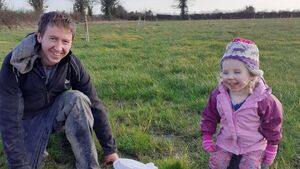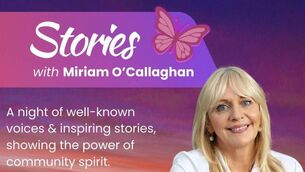Two Laois farmers in groundbreaking new book

Portlaoise farmer John McHugh gets a helping hand on his land
TWO Laois farmers are among the contributors to a groundbreaking new book, which explores practical ways to create a more sustainable farming future.
John McHugh from Clondarrig, Portlaoise and Bruce Thompson from Ballyfin joined forces with other nature lovers in The Farming For Nature Handbook, which will be launched on 28 November.
Illustrated with beautiful watercolours and sketches, the book combines scientific research with local knowledge to give practical tips on how to create a more sustainable future, while protecting and restoring nature.
With contributions from more than 50 Irish farmers, the book also shares farmers’ experiences of how working with nature can help reduce costs and improve incomes.
At his farm in Portlaoise, dairy farmer and Farming For Nature ambassador John says that most farmers underestimate the scope to reduce costs and remain profitable by farming for nature.
He explains: “Productivity is output per unit input. The more I learned about the true cost of the inputs I used, the more I realised how unproductive I was. It’s not a blueprint that is encouraged by the industry. I think it’s time that we stop farming for the industry and start farming for our own, our families’ and our communities’ wellbeing. That will see us looking back to nature.” Meanwhile, dairy farmer Bruce is well known for his expertise on the dung beetle and his focus on the vital role of beetles in the ecosystem.
The Ballyfin farmer says: “Dung is a microhabitat for a whole diverse range of small creatures but, for me, the king of these is the indomitable dung beetle. Modern farming techniques have depleted a lot of our beetle populations. “Practices such as grassland tillage, wet dung pats derived from modern grass management and the removal of animals from fields in autumn, leaving no food for the beetles until spring, have all contributed to beetle decline.
“However, the biggest factor of all is the use of anthelmintics to ‘control’ parasites in animals. These animal remedies are toxic to beetles. The real tragedy of losing beetles and other dung-derived insects is their loss as a food source for the wider animal kingdom.” While there is widespread awareness of the environmental damage caused by poor farming practices, the book highlights the positive ways farmers can sustain and enhance the natural environment, and benefit from the results. It is targeted not just at farmers but at anyone who wants to ‘grow, garden and gather better’.
The book was inspired by regular requests to the non-profit Farming For Nature project from landowners, farmers, smallholders and growers wanting to learn how best to manage their land, big or small, in a way that enhances habitats, protects profits and safeguards rural communities.
The book was conceived and developed by Brigid Barry, researched and mainly written by conservation ecologist Dr Emma Hart on behalf of Farming For Nature and co-edited by Dr Brendan Dunford of the Burrenbeo Trust. It is illustrated with watercolours and sketches by farmer and artist Clive Bright, as well as digital images by scientific illustrator William Helps.
The book was described by President of Ireland Michael D Higgins as “a timely and essential contribution to the ongoing discourse on how we, as a society, must respond to some of the most pressing challenges of our time”.
Published by Dingle Publishing, it is available to order for €30 at www.farmingfornature.ie. It was supported financially by the National Parks and Wildlife Service, the Department of Agriculture, Food and the Marine, and the Lifes2Good Foundation.




